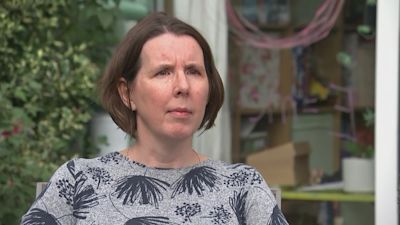'It's going to make us prisoners again': For some 'freedom day' is a source of fear not joy

When Health Secretary Sajid Javid announced in parliament that the government would be scrapping almost all of its coronavirus regulations in the final step of unlocking, one MP shouted ‘hallelujah’.
For many, this is a moment of celebration after more than a year of instability and hardship.
But the easing of restrictions are a source of fear not joy for those who are vulnerable to the virus.
Jane Leahy is in remission from blood cancer and has been shielding and working from home throughout the pandemic.
"It’s been difficult" she says, "we’ve spent a lot of time at home...we were looking forward to getting out now."
Where some herald the relaxation of rules, planned for July 19, as 'freedom day' Jane is worried it will be "quite the opposite" for those with an impaired immune system.
Lockdown rules in England: What's changing from July 19
What has happened to social distancing and the rule of six?
What has happened to social distancing and the rule of six?
The 'one metre plus' rule has been scrapped entirely, as of July 19 in England. However, some guidance to maintain social distancing in certain situations will remain in place of the legal restrictions.
Social distancing guidance will continue if someone is Covid positive and self-isolating, or in airports, or other ports of entry, to avoid travellers arriving from amber or red-list countries mixing with those from green list areas.
Limits on social contact in England have disappeared, meaning the end of the rule of six indoors and the limit of 30 people for outdoor gatherings.
Do I still need to wear a face mask?
Do I still need to wear a face mask?
There is now no legal requirements to wear face coverings - but guidance still encourages using masks in some settings, including hospitals, healthcare settings and in crowded enclosed public spaces.
Has the working from home guidance changed?
Has the working from home guidance changed?
The guidance on working from home has gone. It's ultimately down to employers to decide whether to keep staff at home or in the office, but the government say employers are able to plan the return of staff to the workplace.
What about weddings and funerals?
What about weddings and funerals?
The current limits on numbers of people who can attend weddings, funerals and other life events has ended.
What's happening in Wales, Scotland and Northern Ireland?
What's happening in Wales, Scotland and Northern Ireland?
The changes to Covid rules announced by Boris Johnson, only impact England and will not change regulations in Northern Ireland, Wales or Scotland.
The Welsh Government “would like to move together” with other parts of the UK in lifting coronavirus restrictions but will only do so if it is “right for Wales”, health minister Eluned Morgan said on Monday 5 July.
As of July 19, restrictions in Scotland have eased, with all areas of the country moving to level 0. The government is aiming to lift all major restrictions in Scotland by August 9.
In Northern Ireland, some significant restrictions have already been eased including allowing the resumption of live music and the lifting of caps on organised outdoor gatherings.
"It’s too much too soon for the general population and, for those of us who feel vulnerable, it’s just going to push us back into our own homes and make us prisoners again."
Jane says she will be staying away from any celebrations after the end of lockdown restrictions and will be "steering clear from crowds or any situations that may put me at risk."
The end of mandatory mask-wearing has been a controversial part of the plans for step four of the roadmap with Labour calling for a u-turn on the issue.
Jane says she's "really quite scared" by the prospect of people no longer being made to wear masks and worries that "if it's not enforced...people will ditch it."
"I need other people to protect me because I am immunocompromised and I don’t know how I would react if I were to catch Covid."
On Tuesday, Sajid Javid announced that, as part of the unlocking, isolation for double-jabbed contacts of positive cases would be scrapped from August 16.
Jane, a self-proclaimed "theatre buff", says the move has made her "really worried" as "there will no space between me and anyone else, and they won’t be wearing masks and I won’t know if they’ve been exposed to Covid in the last week and will no longer need to isolate."
Vulnerable people, she says, will not "know if the person sitting next to us on the train, or in a restaurant or a cafe, might have had Covid or might be contagious."
With the reopening, the government is aiming to move from state-imposed regulations to 'personal responsibility' as the guiding force behind precautions against the virus.
But the natural discrepancy in people's approach to the virus, after the final unlocking, is frightening for those whose health forces them and their families to be more wary.
Jane says she feels sorry for her children who “are now facing a future where everyone will be free except us, except them”.